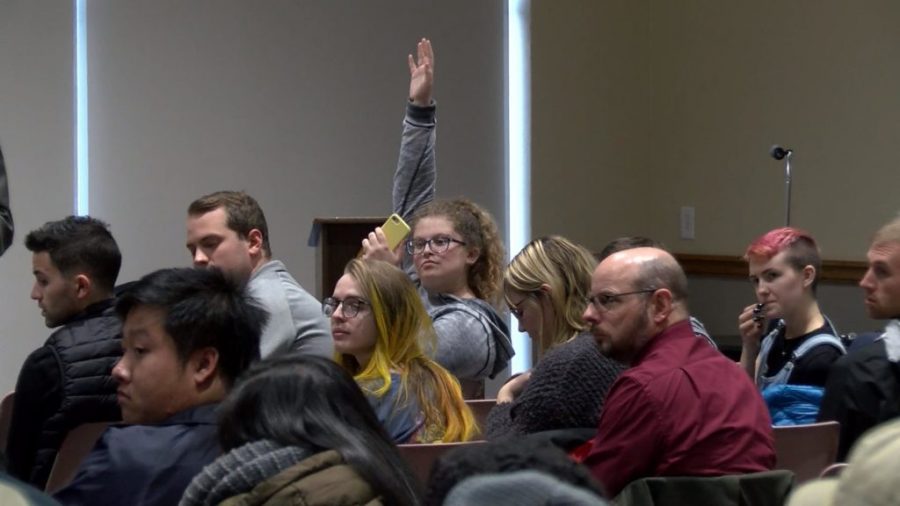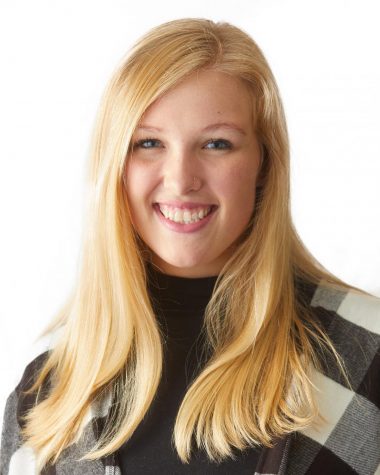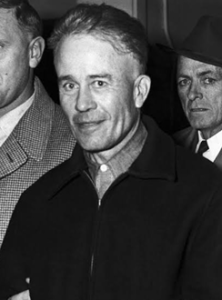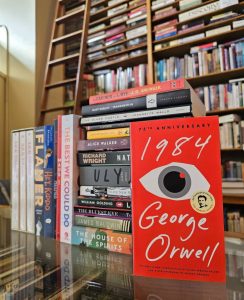Students pose questions surrounding transparency and support at Chancellor Gow’s open forum
UWL Senior Alyson Young waits to ask a question to Chancellor Gow at his annual open forum. Photo retrived by WXOW.
November 15, 2019
On Nov. 14, at 3:30 p.m. at the University of Wisconsin-La Crosse Cleary Center, Chancellor Joe Gow hosted his annual Open Forum to provide a platform for students to ask questions and put forth ideas. Present were both students, members of the Title IX team, and administrators. By the time Gow began the event, it was standing room only.
The event began with an introduction from Gow, and a reminder to students to avoid topics regarding the specifics of sexual misconduct cases. After an initial question posed by an administrator, Gow directed the focus to a student who stood to read off UWL’s remembrance statement:
“We would like to recognize that the University of Wisconsin-La Crosse occupies the land of the Ho-Chunk people. Please take a moment to celebrate and honor this ancestral Ho-Chunk land, and the ancestral land of all indigenous peoples.”
After hearing the statement, Gow added that during his recent trip to the University of Wisconsin-Madison, he thought about adopting a new word into the UWL Land Recognition statement in UW fashion. “The University occupies the Ancestral homeland of the Ho-Chunk people. In many cases, to say that we occupy the land of the Ho-Chunk people is not historically accurate. You can go read about how the Ho-Chunk people were very brutally and unjustly removed from these lands in the mid-1800s by United States Government Policy. So I think we need to be very clear that we tell that story. That would be my preference.”
“What makes this land ancestral?” asked one student in response, “When you still have Ho-Chunk students that live here and go to this University?”
“Legally, the University bought this land in 1909. I don’t want to imply that we [UWL] are coming in and taking the people out. Because that didn’t happen. But I think we can tell the whole story and tell it accurately.”
Students voiced their opinions about the ethicality of this statement by re-emphasizing the presence of modern-day indigenous people currently at the university.
The dialogue continued as students spoke to Gow’s absence at multicultural events. “We invited you to the plaque ceremony. You were not there.” Gow later said that this was due to a death in the family.
“The president of the Ho-Chunk nation emailed you for a meeting, and you never reached out to him,” said a UWL student. “I don’t know how you would know that,” said Gow. “I’m sorry. That just isn’t so.”
Students then raised concerns about the lack of news that they were received directly from the administration, as opposed to other sources such as social media and hearsay, and made points to direct the conversation towards outcomes of communication that were student orientated.
“I’m always open to– if people want to know information, we’ll certainly give you as much as we can. It’s just hard to know, and that’s why we do these gatherings, what are people seeking to know?” said Gow in his explanation of current University information dissemination. Gow said that student outreach is critical to his ability to provide answers.
“Don’t you think its a little hard for us to ask questions about topics we don’t know about?” said one student in response.
“It’s a bit of a paradox. You don’t know what you don’t know. But we don’t know what you don’t know,” said Gow.
Gow then referenced the student senate, “They do a great job of topics. I go there and speak from time to time, and answer questions. The academic staff has a group too. We have to have some sort of structure to know what are the issues that people want to know about.”
Whilst discussing transparency, conflicts of definitions became a topic of conversation. Students voiced their need for general and legislative knowledge to be included in Gow’s regular emails to the student body, in hopes that this would provide the foundational information needed to spark more student involvement and dialogue. Gow said in response that sharing information potentially compromises open investigations; “On the sexual misconduct situation, there will not be much transparency.”
One student said, about Gow’s impetus to inform about campus events; “It is not a concern of yours [Gow’s]. To pass that information down. Not that you’re hiding it, but it’s not something that you’re thinking about. And we are suffering the consequences of something you don’t think about.”
Senior Kendra Whelan, who identified herself during the forum, spoke to Gow about the ability of students to obey due process in professional settings. “No one here is asking you to name names or to rush to judgment. The Office of Campus Climate had a listening and learn session and it went wonderfully. We did not run into any issues, we talked about our policy and had a good discussion on healing processes on campus. And you were not there to see that,” said Whelan. “We as a campus community are capable of holding our tongue.”
“I’m trying, and it’s very hard in an age of social media, to make sure that our process gets followed. Because if it doesn’t get followed, then the accused person may address than in court,” said Gow.
Whelan responded by asking if there is a middle ground, stating that no communication allows for frustration and rumors. “I don’t think there is,” said Gow in response. “I would encourage you to go read the law, WS Chapter 4, you can type that into google, and you’ll see, it’s very clear on what has to happen, and I don’t think we can deviate from that.”
The feeling of insecurity, as a result of recent campus events, was brought up during the forum. Examples cited included the recent development of publicly held office hours in the Campus Climate Office (to provide students with a safe space for one-on-one academic instruction), as well as the incident of student harassment that recently took place in response to a school-wide survey about clitoral masturbation, of which Gow said he was unfamiliar.
“Our University Police colleagues are doing a lot regarding immediate outreach and investigation of the matter. There are a number of other offices, including Campus Climate Office, my own office, Dean of Students office, that have been working directly with the student involved in that matter to ensure their safety,” said Title IX Coordinator and Director of Equity and Affirmative Action Nizam Arain in response to questions about campus values and safety measures. “I think it’s important for folx to know that death threats and rape threats are not free speech.”
In the last half hour of the session, the Annual Security Report (a compliance facet of the Clery Act) was addressed as a medium for transparency. The ASR contains 99 pages of information relating to policy, procedures, and numbers and statistics of crimes occurring on the UWL campus every year. Whelan asked administrators who were present if an open forum specifically related to the ASR is a possibility.
“I think that’s a very good suggestion,” said Gow.
“We can certainly look at moving forward with having an open forum to discuss the Annual Security Report, and the information that is included in that. I do believe that is a good idea,” said Assistant Dean of Students Kara Ostlund.
Students called for informational clarity focused on the correlational details of cases, not information that directly pertains to open investigations. Students at the forum spoke more than once about the need to rebuild trust in administration through student involvement in policy and decision making.
“We don’t believe by nature that you are inherently a bad person, but the point is that the impact that has had on this campus, from the lack of transparency in terms of other forms of transparency, has distorted your intent as the person who leads this campus,” said a student to Gow during the forum. “Yes you may be the judge of this situation, but it is within your scope and power to organize other people to inform us and show your support.”







